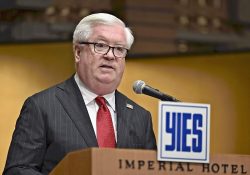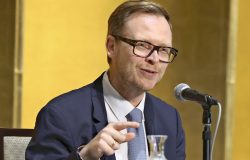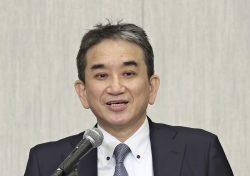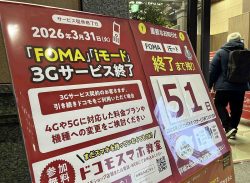Bank of Japan Gov. Kazuo Ueda Expresses Positive Outlook for Japan’s Economy; Warns Against Excessive Depreciation of Yen

Bank of Japan Gov. Kazuo Ueda speaks at a Yomiuri International Economic Society (YIES) symposium held at Tokyo Kaikan in Chiyoda Ward, Tokyo, on Wednesday.
18:50 JST, May 8, 2024
Bank of Japan Gov. Kazuo Ueda expressed his views on the current economic situation in Japan, saying “Underlying inflation in Japan is firmly moving toward 2%, and it has been confirmed that the virtuous cycle between wages and prices has become more solid,” in his speech at a Yomiuri International Economic Society (YIES) symposium held at Tokyo Kaikan in Chiyoda Ward, Tokyo.
Regarding future policy decisions, Ueda said, “If underlying inflation rises in line with the bank’s outlook, the appropriate degree of monetary accommodation from the perspective of achieving the price stability target will change, and the bank will adjust the degree of monetary accommodation.”
The BOJ changed the direction of its large-scale monetary easing policy by discontinuing its negative interest rate policy at its March monetary policy meeting and then made no further changes at the April 26 Monetary Policy Meeting.
The BOJ will consider making adjustments to monetary policy, such as additional interest rate hikes, while monitoring economic conditions and actual price trends, in order to achieve the 2% target stable price inflation rate.
Ueda expressed his view that “All of the indicators [that the BOJ is using to capture the trend in prices] have been rising gradually, meaning that underlying inflation is almost certainly rising. At this point, underlying inflation seems to be on a rising path toward the 2% level.”
Regarding recent foreign exchange markets trends, Ueda said, “Rapid depreciation of the yen is unfavorable for the Japanese economy as it increases uncertainty, such as by making it difficult for companies to pursue their business plans.”
After the BOJ decided to maintain its monetary policy in April, the yen depreciated in the foreign exchange markets, temporarily falling to the ¥160-per-dollar level on the expectation that the interest rate gap between the United States and Japan will widen.
Ueda said, “Monetary policy is not taken to directly control exchange rate.” Ueda added, “If exchange rate movements affect the underlying rate of price inflation, or if the risk of such movement increases markedly, we will need to take policy actions.”
In the quarterly Outlook for Economic Activity and Prices report released after the April meeting, the bank revised upward its forecasts for inflation rates excluding fresh food in fiscal 2024 and 2025 from its January forecasts and set its fiscal 2026 forecast at 1.9%. The outlook for inflation in fiscal 2024, as indicated in the report, was revised upward in consideration of the higher price of crude oil since January and the high level of wage hikes agreed at this year’s shunto spring wage negotiations.
Top Articles in Business
-

Prudential Life Insurance Plans to Fully Compensate for Damages Caused by Fraudulent Actions Without Waiting for Third-Party Committee Review
-

Japan, U.S. Name 3 Inaugural Investment Projects; Reached Agreement After Considerable Difficulty
-

Japan’s Major Real Estate Firms Expanding Overseas Businesses to Secure Future Growth, Focusing on Europe, U.S., Asia
-

SoftBank Launches AI Service for Call Centers That Converts Harsh Customer Voices into Softer Voices
-

Transport Companies See Opportunity in Narita Expansion; Airlines, Railways Prepare to Meet Expected Growth in Demand
JN ACCESS RANKING
-

Producer Behind Pop Group XG Arrested for Cocaine Possession
-

Japan PM Takaichi’s Cabinet Resigns en Masse
-

Man Infected with Measles Reportedly Dined at Restaurant in Tokyo Station
-

Israeli Ambassador to Japan Speaks about Japan’s Role in the Reconstruction of Gaza
-

Videos Plagiarized, Reposted with False Subtitles Claiming ‘Ryukyu Belongs to China’; Anti-China False Information Also Posted in Japan


























